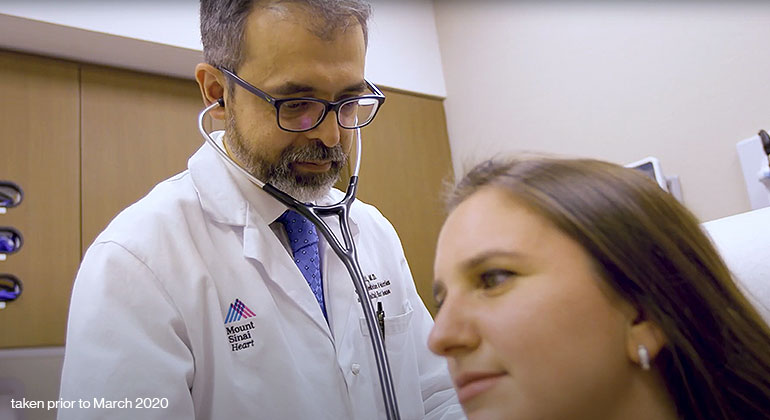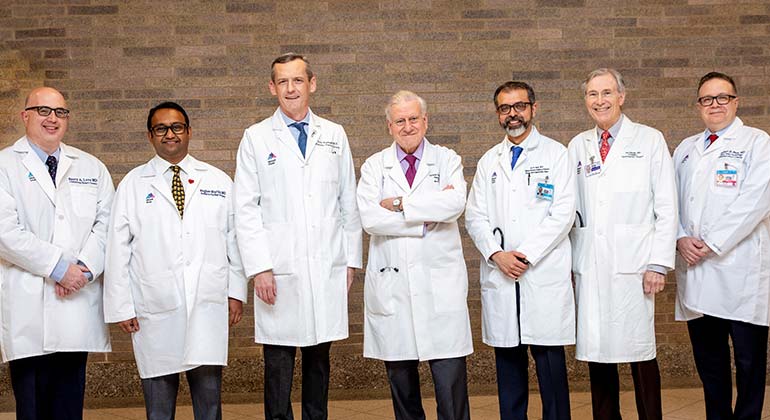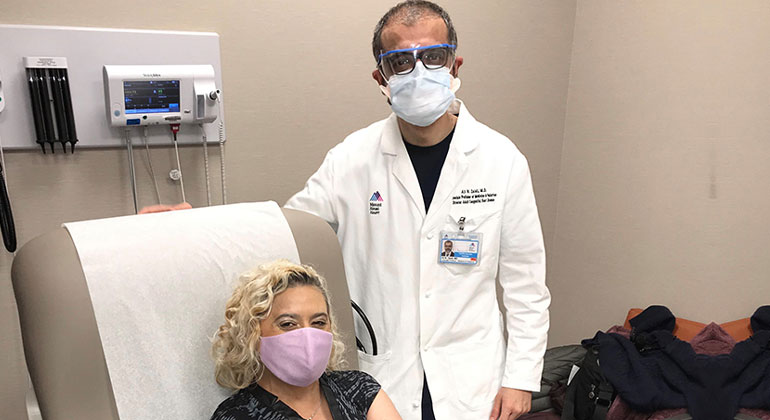Adult Congenital Heart Disease

Broadway Actor Finds Support through the Adult Congenital Heart Disease Center at Mount Sinai
Born with a heart condition called truncus arteriosus led Alex to the adult congenital heart disease experts at Mount Sinai

Adult Congenital Heart Disease Center
Hear how the Center provides comprehensive care for adults with Congenital Heart Disease, regardless of age or severity of illness.

The Adult Congenital Heart Disease Team
A heart defect is a lifelong challenge. If you are born with a heart defect, it is called congenital heart disease. This condition requires you to become your own health care advocate. There are various types of congenital heart defects. All are different, though, than heart issues that develop in adulthood. It is important to know and understand what living with your particular defect means for managing your life.
Congenital heart disease is very common. Each year, nearly one out of every 100 babies is born with a heart defect. Fortunately, we have seen many scientific advancements over the last 40 years, and more than 90 percent of these patients now live well into adulthood. The Mount Sinai Adult Congenital Heart Disease Center serves the medical and surgical needs of this growing population of adolescents and adults.
Services We Provide
We see patients at The Zena and Michael A. Wiener Cardiovascular Institute and the Children’s Heart Center at Mount Sinai Kravis Children’s Hospital. We provide a variety of services through the Mount Sinai Adult Congenital Heart Disease Center. Our services include:
- Adult congenital cardiac surgery
- Multimodality congenital cardiac imaging
- Cardiopulmonary exercise testing
- Diagnostic and interventional cardiac catheterization, including transcatheter valve therapies
- Electrophysiology, pacing and complex arrhythmia management
- Advanced heart failure, mechanical circulatory support and cardiac transplantation
- Comprehensive evaluation and management for pulmonary hypertension
- Cardiovascular genetics
- Single ventricle fontan clinic
- Gastroenterology, hepatology and liver transplantation
- Reproductive health, fertility management and high-risk pregnancy
- Neurocognitive assessment and care
- Transition of care for adolescents with congenital heart disease
- Pulmonary and sleep medicine
Single Ventricle Fontan Clinic
Mount Sinai’s Fontan Clinic offers a dedicated single ventricle survivorship program, providing complete evaluations, monitoring and long-term care for adolescent and adult patients with single ventricle defects after Fontan palliation. Drawing on the resources of the Mount Sinai Health System, Mount Sinai’s Single Ventricle Fontan Program includes a comprehensive multidisciplinary program in New York State where ACHD specialists, liver specialists, nutritionists, mental health and social workers all work together in a single setting, to ensure patients receive the most advanced, integrated, and comprehensive care.
Adult Congenital Heart Disease and Pulmonary Hypertension
As they get older, some adults with congenital heart disease develop pulmonary hypertension—meaning the arteries in their lungs get hard and narrow, making it difficult for their heart to pump. Less often, people develop Eisenmenger’s syndrome, a hole between the heart chambers that causes the blood to circulate abnormally within the heart and lungs. We offer all diagnostic and therapeutic options you might need for both of these conditions. We work closely with the Mount Sinai Pulmonary Hypertension Program. Our state-of-the-art diagnostic testing includes:
- Advanced cardiovascular imaging
- Cardiopulmonary exercise testing
- Lung V/Q tests
- Pulmonary function tests
- Right heart catheterization with vasoreactivity testing
- Six-minute walk test
We also offer a variety of treatments for pulmonary hypertension. We can provide these treatments orally, through inhalation, intravenously, or subcutaneously (injection beneath the skin), depending on your condition and preference. If appropriate, we can also help you participate in clinical research studies.
Reproductive Health, Fertility Management, and High-Risk Pregnancy
Preparing for the birth of a child can be very challenging and exciting. As with all pregnant women, it is important to follow your provider’s recommendations and continue a healthy lifestyle. All pregnancies carry some risk even if you don’t have a history of heart disease.
If you do have congenital heart disease, you may need to take additional precautions. Women with congenital heart defects face higher risks for both themselves and the fetus. If you have a complex cardiac defect, you have a greater risk of complications than if you have a simple heart defect. Fortunately, most women with congenital heart defects can have a healthy pregnancy. There are some conditions where we do not recommend pregnancy.
At Mount Sinai, we provide a team to meet all your needs. The team includes your cardiologist, gynecologist, maternal fetal medicine consultant, and primary care doctor. Your doctors will make specific recommendations, based on what type of heart defect you have. In general, we recommend our heart patients follow these tips for a healthy pregnancy:
- Follow your provider’s direct orders
- Avoid alcohol, drugs, and tobacco products
- Eat healthy
- Get plenty of rest
- Take all prescribed medications
We fully expect our patients with congenital heart defects to survive to adulthood, have a family, and lead a full adult life. To help you achieve this, we provide comprehensive care for you and your fetus during pregnancy. We also offer extensive follow-up care after you give birth.
Neurocognitive Care
If a child has congenital heart disease, the heart defect can mean the brain gets an abnormal amount of oxygen or blood. This can lead to difficulties understanding and responding to the environment. We call these neurocognitive issues. Medical science has developed many successful surgical treatments and improved outcomes for these patients. Even so, many adults may have long-term problems. These might include difficulty paying attention, learning, performing gross and fine motor skills, or speaking and understanding oral or written language. We can provide comprehensive assessment and care.
Transition of Care
Sometimes doctors discover congenital heart disease during pregnancy or early childhood. As your child gets older, heart care will be one of many transitions he or she will face. Teens progress from child to adult, from learner to teacher, and from dependence to independence. They learn the life skills they need to make these changes. Teens with congenital heart defects may continue to have heart problems or may develop new concerns. They may need to continue consulting with a congenital heart disease specialist.
Our program serves patients who are at least 15 years old. We begin transitioning patients to an adult congenital heart disease specialist while they are still seeing their pediatric doctor. Our team assesses the patient’s knowledge about his or her condition. Then we teach the patient about their condition through a one-on-one visit with a transition nurse, written material, or both. We develop an individualized plan to enable the patient to take control of their own health care decisions as they enter adulthood. The transition process can take several visits.
We encourage you and your family to discuss the transition process with your medical providers. Responsibility for all medical care will shift from parents to the young adult. Young adults will take control of all health-related decisions and will sign all consent forms. Health care providers will need patients’ permission to speak with their parents. Insurance companies, too, will also need permission to speak with a parent. This is true even if the parent is the policy holder or paying the bills.


